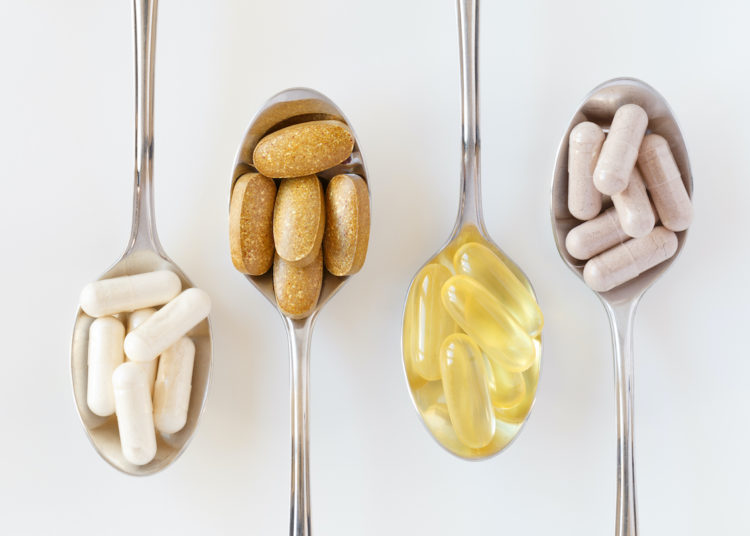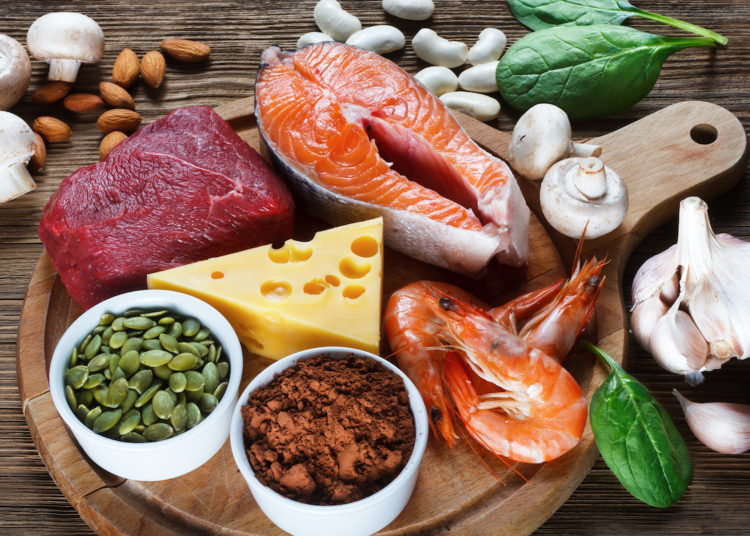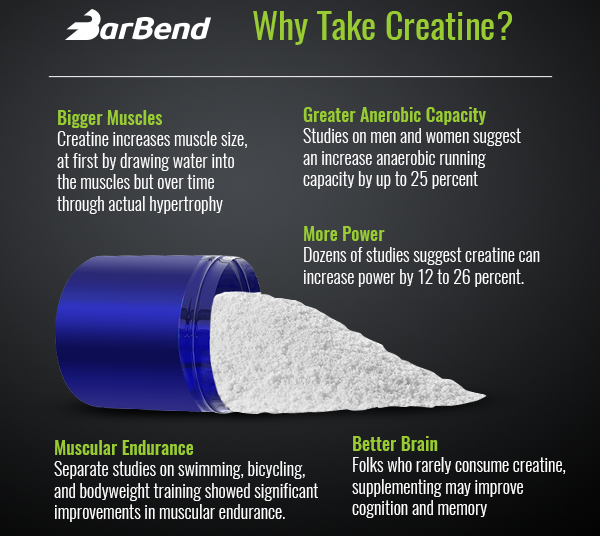Sore muscles suck. Your WODs are modified, you scale back only to train movements that don’t cause you discomfort, but it’s still not the same as before. Sticking to your physical therapist’s rehabilitation plan is a sure way to help you get back in the game, and should absolutely be your priority before you think about supplements. Once you’re following a physician’s orders and you’ve cleared it with them, it might be a good idea to consider some nutrients that have some links to recovery.
(Again, only if your doctor has given you the go ahead.)
Editor’s note: The content on BarBend is meant to be informative in nature, but it shouldn’t take the place of advice and/or supervision from a medical professional. The opinions and articles on this site are not intended for use as diagnosis, prevention, and/or treatment of health problems. Speak with your physician if you have any concerns.

Curcumin
Curcumin is a phenomenally popular compound derived from the turmeric plant that appears to have anti-inflammatory and antioxidant properties (1). Numerous studies have suggested a strong effect in decreasing inflammatory proteins and assisting with cell regeneration (2). Whether you take it in pill form, mix it into smoothies, or dissolve it into hot drinks, curcumin is best paired with black pepper to improve bioavailability — which increase up to 2000%, according to some research (3). If you’re uncertain of what the proper dose to take it, we’ve sorted out a best curcumin list for reference.
[Related: A dietitian’s take on the benefits of curcumin.]
Glucosamine
Glucosamine is responsible for creating molecules found in tendons, skin, joints, and ligaments. It’s most commonly used for its potential role in treating symptoms of osteoarthritis and rheumatoid arthritis, though some research suggests that 28 days of supplementation could help with rehabbing damaged joints, reducing swelling, and improving range of motion (4, 5, 6, 7). To get the most bang for your buck, studies suggest a dosage of 1,500mg of glucosamine with 800mg of chondroitin (8).

[Related: Macronutrients vs. micronutrients: which matters most?]
Zinc
In supplement form, zinc is generally used for its potential role in supporting normal immune function. Research suggests it can also help to reduce oxidative stress — that’s what antioxidants do — and inflammatory responses (9). Zinc seems to have a role in membrane repair, combating oxidative stress, coagulation, inflammation, and immunity. Regular levels of zinc supplementation range from 15–30 mg/day in adults which can be easily consumed in pill form or even through your diet.(10) Try mixing in more lean meat, shellfish, nuts and seeds into your meal prep or treat yourself to some dark chocolate.
Creatine
The direct effects of creatine on healing haven’t really been studied, so it makes sense to maintain some skepticism. That said, one 12-week study showed supplementation of 5 to 10 grams per day (that’s a standard dose for athletes) helped to reduce muscle atrophy during a 2 week period of inactivity (11). They also noted enhanced muscle function and hypertrophy.
[Related: 9 ways to absorb your nutrients more effectively]
L-Arginine
In a 2015 study, the benefits of L-arginine were put to the test on a muscle strain and a dose of 3 grams a day resulted in faster repairs to the trauma, largely due to the development of new blood vessels that improved nutrient absorption and energy production (12). If you’re a regular consumer of meat (turkey, chicken, beef) or legumes (chickpeas, lentils), you might already be reaping the benefits of this amino acid. Other foods high in L-arginine include nuts, seeds, spinach, and spirulina.
Wrapping Up
Remember, always consult with a doctor before making any changes to your supplement regimen.
References:
- Sun, L., Liu, X., Chen, X. et al. Curcumin attenuates high glucose-induced podocyte apoptosis by regulating functional connections between caveolin-1 phosphorylation and ROS. Acta Pharmacol Sin 37, 645–655 (2016)
- Tsai, S.-W., Huang, C.-C., Hsu, Y.-J., Chen, C.-J., Lee, P.-Y., Huang, Y.-H., … Tung, Y.-T. (2020). Accelerated Muscle Recovery After In Vivo Curcumin Supplementation. Natural Product Communications.
- Shoba G, Joy D, Joseph T, Majeed M, Rajendran R, Srinivas PS. Influence of piperine on the pharmacokinetics of curcumin in animals and human volunteers. Planta Med. 1998;64(4):353-356. doi:10.1055/s-2006-957450
- Glucosamine and Chondroitin for Osteoarthritis, EC HUSKISSON King Edward VII Hospital, London, UK, The Journal of International Medical Research 2008; 36(6) 6
- Kucharz EJ, Kovalenko V, Szántó S, Bruyère O, Cooper C, Reginster JY. A review of glucosamine for knee osteoarthritis: why patented crystalline glucosamine sulfate should be differentiated from other glucosamines to maximize clinical outcomes. Curr Med Res Opin. 2016;32(6):997-1004. doi:10.1185/03007995.2016.1154521
- Azuma K, Osaki T, Wakuda T, et al. Suppressive effects of N-acetyl-D-glucosamine on rheumatoid arthritis mouse models. Inflammation. 2012;35(4):1462-1465. doi:10.1007/s10753-012-9459-0
- Ostojic SM, Arsic M, Prodanovic S, Vukovic J, Zlatanovic M. Glucosamine administration in athletes: effects on recovery of acute knee injury. Res Sports Med. 2007;15(2):113-124. doi:10.1080/15438620701405248
- Fransen M, Agaliotis M, Nairn L, et al. Glucosamine and chondroitin for knee osteoarthritis: a double-blind randomised placebo-controlled clinical trial evaluating single and combination regimens. Ann Rheum Dis. 2015;74(5):851-858. doi:10.1136/annrheumdis-2013-203954
- Prasad AS. Zinc is an Antioxidant and Anti-Inflammatory Agent: Its Role in Human Health. Front Nutr. 2014;1:14. Published 2014 Sep 1. doi:10.3389/fnut.2014.00014
- Gupta M, Mahajan VK, Mehta KS, Chauhan PS. Zinc therapy in dermatology: a review. Dermatol Res Pract. 2014;2014:709152. doi:10.1155/2014/709152
- Hespel P, Op’t Eijnde B, Van Leemputte M, et al. Oral creatine supplementation facilitates the rehabilitation of disuse atrophy and alters the expression of muscle myogenic factors in humans. J Physiol. 2001;536(Pt 2):625-633. doi:10.1111/j.1469-7793.2001.0625c.xd
- Couto LI, Wuicik WL, Kuhn I, Capriotti JR, Repka JC. Effects of nutritional supplementation with l-arginine on repair of injuries due to muscle strain: experimental study on rats. Rev Bras Ortop. 2015;50(4):455-461. Published 2015 Jul 26. doi:10.1016/j.rboe.2015.07.004
